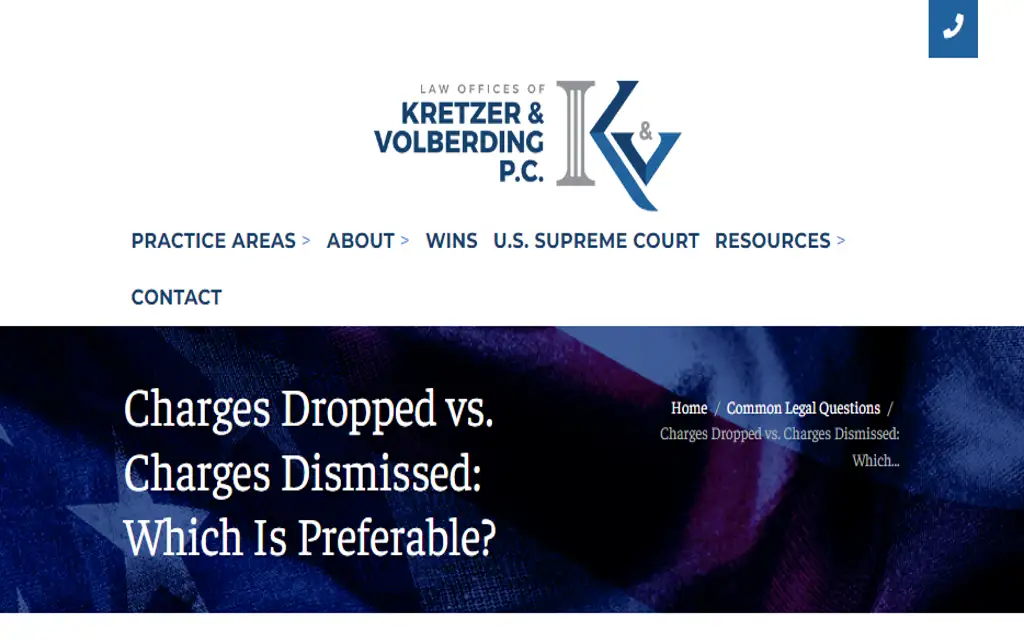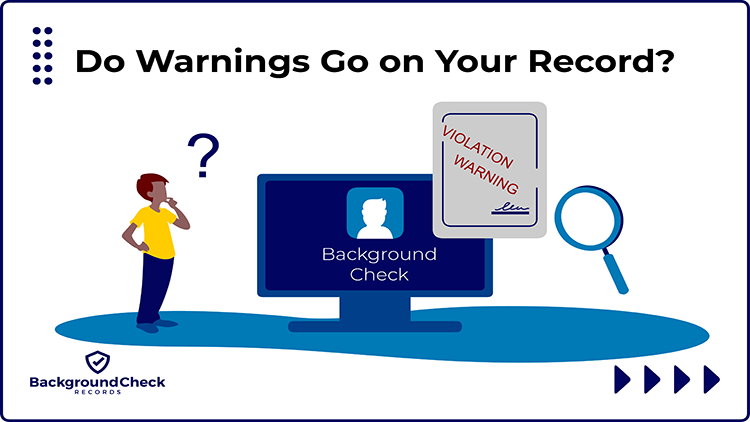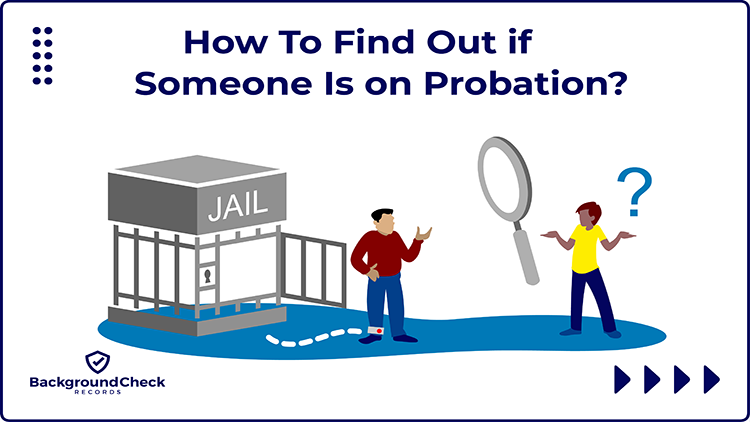We use cookies to ensure that we give you the best experience on our website. If you continue to use this site we will assume that you are happy with it.
Do Dropped Charges Show Up on a Background Check? Do This Now
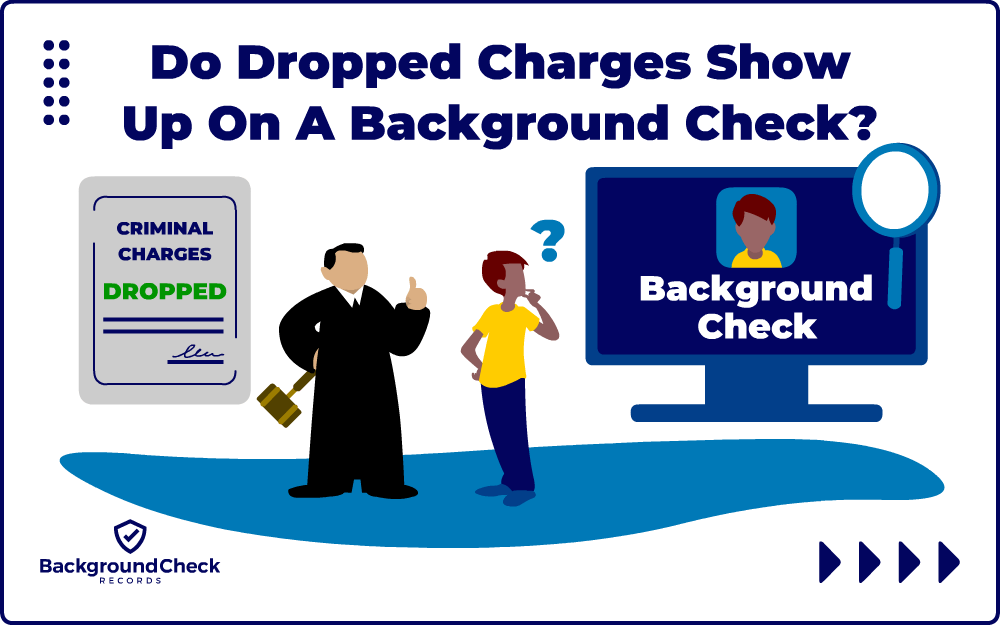
Table of Contents
In the United States, a person is innocent until proven guilty. However, despite the presumption of innocence, most dropped charges still show up on background checks.
Although there are a few exceptions to the rule such as ban the box laws and juvenile, expunged, or sealed records.
Therefore, the only way to ensure dropped charges do not show up on a background check is to check you meet one of the exceptions – so do this now – run a dropped charges background check on yourself before applying for the next job, professional license, or rental unit.
Why Are Dropped Charges Still Reflected on a Background Check?
Any criminal records, including dismissed charges, not-guilty verdicts, and dropped charges, are considered public records in the United States due to state-specific Freedom of Information Laws and currently, only 20 states have provisions that allow for automatic clearing under specific provisions.
In addition, arrest records show up on background checks even when they do not result in a charge or conviction. Most states require the individual to petition the court, pay a fee and have an order by the court to clear (expunge) the record. This creates an extra burden on the individual to remove a charge on their record that did not result in a conviction.1
However, the federal government has taken steps to protect people from unfair hiring practices based on criminal history (dropped or dismissed charges or those with no conviction), and several states are working on making hiring practices more equitable; however, changing laws takes time and cooperation among lawmakers to amend or repeal statutes. These types of legislative activities often take a back seat to other priority projects.
How Dropped Charges Affect Future Employment Opportunities
While it is illegal in some states to use criminal history as a workaround to discriminate against certain job applicants, it does still happen. Smaller companies may still sometimes use the information on a criminal background check (even when charges are dismissed, dropped or a not-guilty adjudication is returned) to deny employment.
Historically, minorities have been denied employment due to unfair practices regarding criminal history checks even for dismissed charges.
In states that do not have specific ban-the-box laws prohibiting this type of discrimination, potential employees must rely on federal statutes for relief. The timing of running background checks and the state that runs the checks answers that question of whether dropped charges show up on background checks.
Ban the Box Laws Protect Against Crime-Based Pre-Employment Discrimination
Historically, individuals with a criminal history have had higher unemployment rates than those without a criminal record, and unemployment based on criminal history has disproportionately impacted people of color (particularly male persons of color).
Inability to gain employment has been linked to recidivism rates, so it is beneficial to have laws that protect individuals from discrimination based on criminal history alone.
Currently 35 states and the District of Columbia have adopted some form of a “Ban the box” law outlining strict guidelines on how agencies and businesses may use criminal history when determining employability to prevent this type of discrimination. The federal government also passed the Fair Chance Act in December 2019 as a way to combat unfair hiring practices of individuals with criminal history for both federal positions and other positions offered by private companies.
In essence, these laws help to avoid criminal record discrimination and can alleviate worry for those concerned about whether or not their dropped charges will show up on a background check report.
So while the charges may show up, these statutes attempt to give those with a criminal record a “fair chance.”
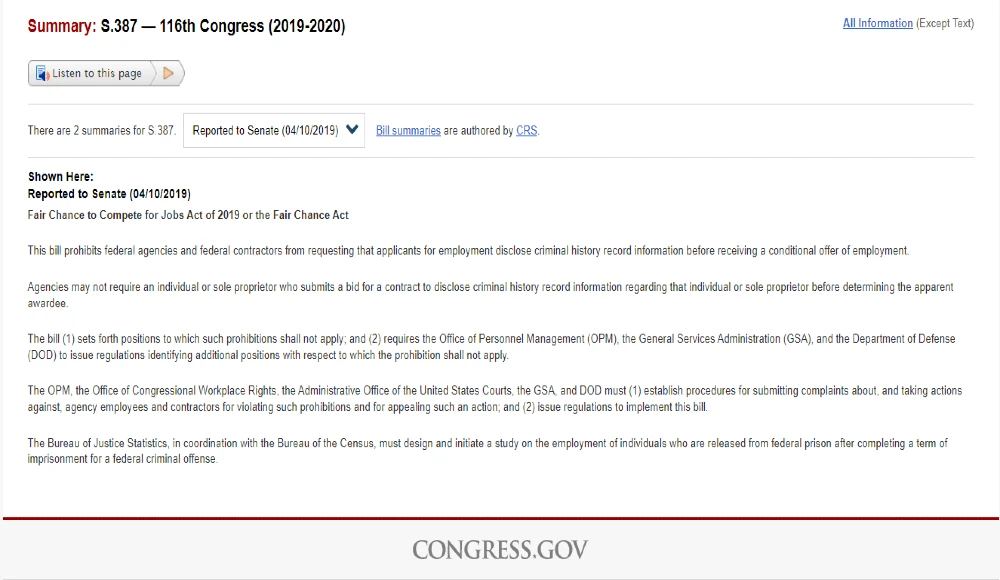
The following table outlines the states that have some form of Ban the Box laws on record and how they are applied:
| State | State Statutes & Laws | How the Law Is Applied |
| Arizona | Executive Order 2017-07 (2nd Chance Employer) | Applies to state agencies prohibiting inquiring about criminal record until after the initial interview. |
| California | Fair Chance Act | Prohibits employers with 5+ employees from inquiring about criminal history before making a job offer. |
| Colorado | Chance to Compete Act | Prohibits employers with 11 or more workers to inquire about criminal history at initial application. |
| Connecticut | Fair Chance Employment Act | Inquiries can only be made during the interview stage or in positions that require a background check under state or federal law (such as social workers or correctional officers). |
| Delaware | House Bill 167 | Inquiries cannot be made before a conditional offer of employment. |
| District of Columbia | Fair Criminal Recording Screening Act | Inquiries can only be made after an initial job offer. Applies to those employing 10+ workers (including seasonal/temporary employees). |
| Georgia | Ban the Box Executive Order | Applies to state agencies, prohibits inquiring about criminal history until later in the selection process unless criminal history alone would disqualify a person from a position (such as corrections, law enforcement, or working with children). |
| Hawaii | Fair Employment Practices Act | Prohibits inquiry until a conditional offer has been made and shortens the “look back” time for record checks. |
| Illinois | Job Opportunities for Qualified Applicants Act | Inquiries cannot be made until the applicant has been offered an interview or conditional offer of employment. |
| Kansas | Executive Order 18-12 | Applies to state agencies only |
| Kentucky | Fair Chance Initiative | Applies to executive branch state jobs. |
| Louisiana | House Bill 707 | States employers may not consider criminal history when there is no conviction. |
| Maine | Fair Chance in Employment | Employers may only inquire about criminal history after individual has been deemed otherwise qualified or during the interview period. |
| Maryland | Criminal Record Screening Compliant Law | Prohibits inquiring about criminal history up to the first interview. |
| Massachusetts | Fair Employment Practices Act | Prohibits acting at initial application about convictions unless specifically required by state or federal law (I.e. licensure or public safety type employment). |
| Michigan | Public Act 84 of 2018 | Limits what non-public employers can ask regarding criminal history. No longer allowed to ask if a person has been convicted of a felony, instead replaced by affirmation of character statement. |
| Minnesota | S.F. 523 (2013) | Inquiries cannot be made into criminal history until the applicant has been offered an interview or a conditional offer of employment. |
| Missouri | Executive Order 16-04 | Removes questions about criminal history unless required by state or federal law to show ineligibility for certain positions. |
| Nebraska | Statute 48-202 | Inquiries about criminal history cannot be made until it is determined the applicant has met the minimum qualifications for the position. |
| Nevada | AB 384 Amendment | Applies to state agencies. |
| New Hampshire | HB 253 | Prohibits inquiries before the interview process references criminal history. |
| New Jersey | Opportunity to Compete Act | Inquiries cannot be made during the initial application process. |
| New Mexico | Criminal Offender Employment Act | Criminal history can only be considered after the applicant has been deemed the finalist for the position. |
| New York | Fair Chance Act | Inquiries cannot be made regarding criminal history until an offer of employment is made. |
| North Carolina | Executive Order 158 | Applies to state government agencies. |
| North Dakota | HB 1282 | Prohibits inquiries by public employers until the applicant is selected for an interview. |
| Ohio | HB 56 | Prohibits employers from including a section about criminal history on applications. |
| Oklahoma | Executive Order 2016-03 | Applies to state agencies. |
| Oregon | Fair Employment Practices Act | Criminal history inquiries cannot be made before the interview stage. |
| Pennsylvania | Fair Chance Hiring Law | Criminal history inquiries cannot be made during the application or interview process. |
| Rhode Island | Fair Employment Practices | Removes question on applications regarding criminal history except for occupations that a criminal history would preclude such as law enforcement or corrections. |
| Tennessee | SB 2440 | Prohibits state employers from making criminal history inquiries on application. |
| Utah | Reducing Barriers to Employment | Prohibits inquiries prior to the interview stage. |
| Vermont | Fair Employment Practices | Inquiries can be made during initial interview or conditional offer of employment. |
| Virginia | Code 19-2-389.3 | Limits inquiries except those required by state and federal law. |
| Washington | Fair Chance Act | Applicants must be initially deemed eligible for a position based on qualifications before inquiry can be made regarding criminal history. |
Note, that each of these statutes or executive orders does not preclude inquiries required by state and federal law for specific positions such as law enforcement, social work, and health.
Fifteen States Where Dropped Charges Appear on Background Checks (States Without Ban the Box Laws)
Fifteen states currently do not have “Ban the Box” laws leaving potential employees to rely on federal protections regarding hiring practices.
The states listed below can still use criminal history to screen out otherwise qualified applicants at the beginning of the hiring process and thus, any information on the criminal background check (including dismissed or dropped charges) can be used as a tool to disqualify an applicant.
- Alabama
- Alaska
- Arkansas
- Florida
- Idaho
- Indiana
- Iowa
- Mississippi
- Montana
- South Carolina
- South Dakota
- Texas
- West Virginia
- Wisconsin
- Wyoming
If you’re curious about whether background checks show out-of-state charges, keep in mind that if the charge originated in one of these states, it’s likely to appear.
Nationwide Equal Employment Laws Surrounding Dropped Charges
The federal government equivalent to “ban the box” laws is the Fair Chance to Compete for Jobs Act. This act prohibits federal agencies from inquiring about criminal history until after a conditional offer of employment is extended to the applicant.
At this time, the applicant is notified of the background check and what it will entail so they can see if dropped charges show up on their background check in particular.
The Equal Employment Opportunity Commission oversees the application of federal employment laws to ensure discrimination is not being used in hiring practices. It also gives guidance to employers on how to effectively screen applicants with a criminal record to give that individual an opportunity to gain employment.
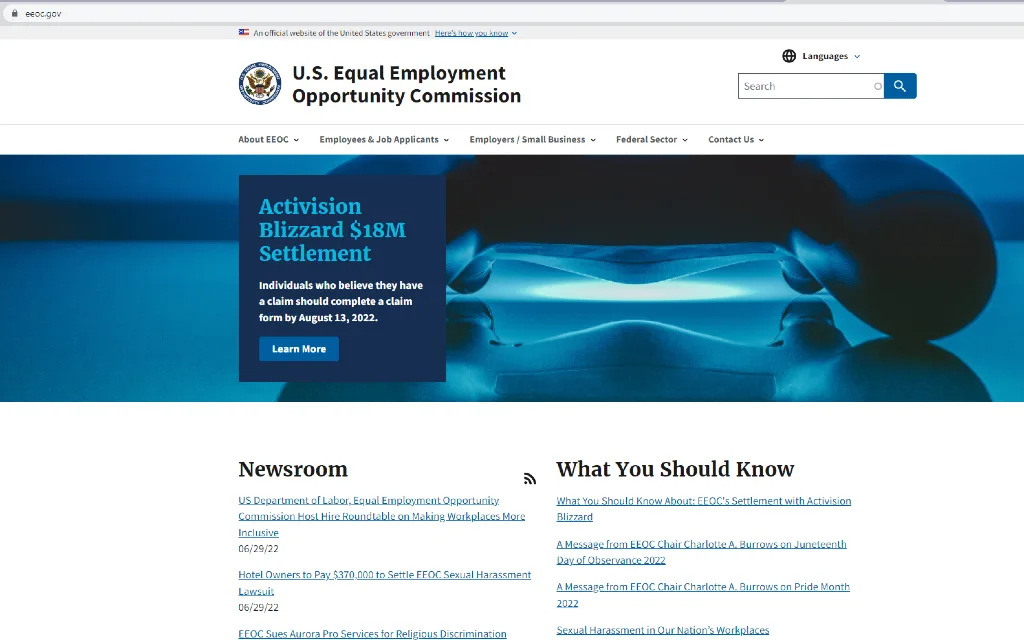
Even some states with ban-the-box laws still have provisions for criminal record checks, and convictions can still preclude individuals from jobs when there is a clear, direct, and substantial relationship between the conviction and the ability to do the job. For example, an individual convicted of child abuse can be excluded from employment in public schools.
Arrests in and of themselves cannot be used as a basis to deny employment per the EEOC guidance. Arrests without convictions should not be held against an applicant when applying for a position. Unless required by statute, pre-employment background checks should be strictly limited.2
How Long Do Dropped Charges Stay on Your Record? How Many Years?
The amount of time dropped charges stay on criminal records varies from state to state, but there is the potential for charges to remain on record forever unless they are sealed or expunged. The rules for expunging records also vary from state to state and will be discussed in more detail later.
The table below outlines states that have automatic relief laws enacted to seal or remove charges from criminal records when no conviction is entered or when a certain timeframe has passed.
| State | Automatic Relief Provided |
| California | When misdemeanor charges are dismissed or there is an acquittal OR one year has passed between the date of arrest and initiation of court proceedings. For non-violent felonies, a three-year period between arrest and initiation of court proceedings.3 |
| Connecticut | When charges are dropped, dismissed, or return a not-guilty verdict and 13 months have lapsed OR the case was continued and remained on “hold” for 13 months.4 |
| Georgia | Misdemeanors 2 years after arrest but subsequently dropped, dismissed, or returned not guilty after law enforcement has closed a case, 4 years for non-violent felonies, and 7 years for violent felonies and sex offenses that do not result in a conviction or are dropped/dismissed.)5 |
| Illinois | If the charges are dropped/dismissed or return an acquittal OR the charge was for possession of fewer than 30 grams of cannabis.6 |
| Kentucky | Felony and misdemeanor cases (on or after 15 July 2020) that resulted in acquittal or dismissal of charges with prejudice.7 |
| Michigan | When charges are dismissed before a trial, all biometrics and data related to an arrest are to be removed from record.8 |
| Nebraska | When a case is dropped and an order of dismissal is entered, the matter is removed from the public record.9 |
| New Jersey | Any dismissals or acquittals (plea bargains are excluded from this provision).10 |
| New York | When charges are dropped or dismissed in favor of the person accused.11 |
| North Carolina | Felonies, misdemeanors, and infractions disposed of on or after 1 December 2021 that are dismissed without leave, dismissed by the court, or return verdicts of no guilt are eligible for automatic expungement12 |
| North Dakota | Limits who can view records of cases dismissed pursuant to a deferred sentence that is subsequently dismissed.13 |
| Oklahoma | Limited to certain first-time drug-related offenses14 |
| Pennsylvania | Any non-conviction is eligible and there is no waiting period before relief can be granted15 |
| South Carolina | Summary Court non-convictions in which fingerprints were not taken at the time of arrest16 |
| South Dakota | When a dismissal is filed in the court, an automatic expungement will be entered as well. Additionally, convictions for minor offenses are automatically expunged after five years.17 |
| Tennessee | When charges are dismissed/dropped, the judge must ask the accused if he/she wants records to be destroyed. If yes, the records are automatic expunged18 |
| Utah | When the accused is acquitted or the case is dismissed with prejudice19 |
| Virginia | Applies to marijuana-related offenses that were dismissed or returned a not-guilty verdict20 |
Dropped Charges Vs. Dismissed Charges Explained
While the outcome is the same for dropped or dismissed charges, the two are fundamentally different in how they occur.
Charges are dropped by the prosecution due to a number of factors such as uncooperative victims or witnesses, lack of physical evidence to support the charges, or other procedural errors that could result in a non-conviction. The prosecutor simply opts to not pursue the charges and “drops” them. Dropped charges usually come before legal proceedings commence. Dropped charges are sometimes referred to as withdrawn charges because the prosecution withdraws the action from court consideration.
While dismissals or dismissed charges can be requested by the criminal defense attorney who argues the prosecution does not have sufficient evidence to support the charges. Dismissals come at a much later stage in the prosecutorial process than dropped charges. Judges or prosecutors can also request the dismissal of charges.
Dropped charges can linger and be reinstated when new evidence is discovered or uncooperative witnesses become more cooperative. Dismissed charges often have jeopardy attached to them, so when they are dismissed they remain dismissed for good.21
Do Dismissed Charges Show Up on Background Checks?
Unless the charges are dismissed in one of the states with automatic relief (erasure) listed earlier in this article, dismissed charges will still show up on a background check if they’re not expunged.
Once the dismissed charges are expunged (erased) from a criminal record, they are no longer public records. A dismissed misdemeanor can show up on a background check, so it’s important to take steps to seal or expunge a record when charges do not result in a conviction.
How Can I Check for Dropped Charges Before an Employment Background Check?
It is possible for individuals to check for dropped charges before undergoing an employment background check. The candidate can conduct a record check at the local clerk of court’s office to see what information is returned.
Most clerks of courts’ offices have public terminals free of charge and only assess a fee for hard copies. Individuals can call the clerk of the court’s office to see if the court is the custodian of records for background checks or if background checks are conducted by another state agency such as the attorney general’s office, state bureau of investigation, or public safety department.
The employment candidate can also pay a third-party site to conduct a background check to see what information is returned. The third-party site could include information for a number of different states instead of just the one the employee resides in.
It is beneficial to do a personal background check before undergoing an employment check to see what information (if any) is returned. Records can sometimes have incorrect information, or records that should have been expunged are still showing up on public records. Doing a personal background check allows the candidate to correct any errors that may appear on a record.
Getting Charges Sealed vs. Expunged
When figuring out whether or not dropped charges show up on a background check, it’s important to know that in certain circumstances, charges can be sealed or expunged just to be 100% sure they don’t show.
Sealed charges cannot be viewed in most circumstances; however, they do not go away when sealed. Expunged charges are erased from the record and cannot be returned to the record once the order to expunge is entered. Each state has its own procedures to seal and expunge charges.
How Do I Seal or Expunge Dropped Charges?
The process to seal or expunge records varies from state to state. Some states have automatic relief codified, others require a waiting period or petition to expunge records, and some do not allow any type of expungement at all.
A brief explanation of the process to seal or expunge records for each state is listed below. An attorney can help streamline the process and increase the chances of success when petitioning the court to erase part or all of a criminal record.
In all but very limited circumstances, juvenile cases are automatically sealed, so this section will deal with adult criminal charges.
- Alabama records are sealed pursuant to an order by the court. To expunge a record, the petitioner charged but not convicted of an infraction, misdemeanor, or non-violent felony that is dismissed without prejudice, returned a verdict of not guilty or returned no true bill by a grand jury can file an action with the court and pay a $300 fee.22
- Alaska does not have a law allowing expungement; however, a request to seal records form can be submitted to the court.39
- Under Arizona law, dropped charges can be sealed pursuant to AS 13-911; however, Arizona does not have a statute granting expungement of records.23
- Arkansas allows for petitions to request records be sealed when charges are dropped, dismissed, or returned not-guilty verdicts. Expungement requests can be filed with the court and a notice is sent to the prosecution and investigating agency that handled the case. The prosecution and agency have 30 days to respond to petitions to expunge dismissed cases for dropped charges. Costs can range from $250-500 depending on the complexity of the matter.24
- California allows for the sealing of cases for three years when charges are dropped by petitioning the investigating agency. A request to seal dismissed charges can be submitted to the Superior Court and DA that had jurisdiction over the proceedings. After 3 years, sealed records can be destroyed (expunged). Costs can range from $400-4000 depending on the county and circumstances.25
- Colorado only allows expungement of juvenile cases and certain underage drinking offenses; however, adults with charges that were dropped, dismissed or returned a not-guilty verdict can file a Petition to Seal Arrest and Criminal Record and pay the processing fee of $65.26
- Connecticut allows for the expungement of records when charges are dropped, dismissed, or return a not-guilty verdict at least 13 months prior to the petition to expunge. Applications can be submitted online.27
- Delaware does not seal adult charges even when dismissed; however, individuals can petition the court to have the record expunged. An expungement packet can be submitted to the State Bureau of Investigation along with the $52.50 processing fee.28
- Florida’s record sealing and expungement process are handled through the Florida Department of Law Enforcement. Petitioners request a Certificate of Eligibility and pay $75 to FDLE. Once the certificate is granted, the petitioner files it with the court. The court has the final decision on sealing or expunging the record.29
- Georgia allows for expungement of misdemeanors 2 years after arrest but subsequently dropped, dismissed, or returned not guilty after law enforcement has closed a case, 4 years for non-violent felonies, and 7 years for violent felonies and sex offenses that do not result in a conviction or are dropped/dismissed.5
- Hawaii requires petitions to the Attorney General’s office to request expunging records when charges are dismissed or dropped. Sealing records requires a petition to the court after the expungement has been granted. There is a $35 fee for a first-time request and $50 for subsequent requests.30
- Idaho allows for non-conviction records to be expunged or those involving certain victims of human trafficking. Applications for expungement for non-convictions can be made to the Idaho State Police immediately or after one year following the arrest depending on the circumstances.31
- Illinois petitioners can fill out a request to Expunge or Seal records in Illinois when there is a non-conviction (dropped, dismissed, or not-guilty verdict).32
- Indiana petitions to seal or expunge records must be filed with the circuit or superior court in which the case was filed. Once the court orders the records to be expunged or destroyed, the Indiana State Police should be notified of the court order.33
- Iowa allows for sealing (expunging) records for non-convictions (dropped, dismissed, or not guilty) misdemeanors. Applications can be made to the local court for consideration using the standardized form. There is no fee for petitioning for expungement.34
- Kansas allows petitions to file a petition for expungement of arrest record to erase records of arrests only or convictions or diversions for non-violent offenses.35
- Kentucky allows for expunging records for felony and misdemeanor cases (on or after 15 July 2020) that resulted in acquittal or dismissal of charges with prejudice automatically.36
- Louisiana requires petitions to file a Motion for Expungement and Sealing to erase or seal dropped or dismissed charges or those that return a not-guilty verdict.37
- Maine does not expunge criminal records; however, an order can be issued to correct or amend records that are inaccurate.38
- Maryland allows individuals charged with crimes that were later dropped, dismissed, or resulted in acquittal to file a Petition for Expungement of Records. There is no fee to file this petition.40
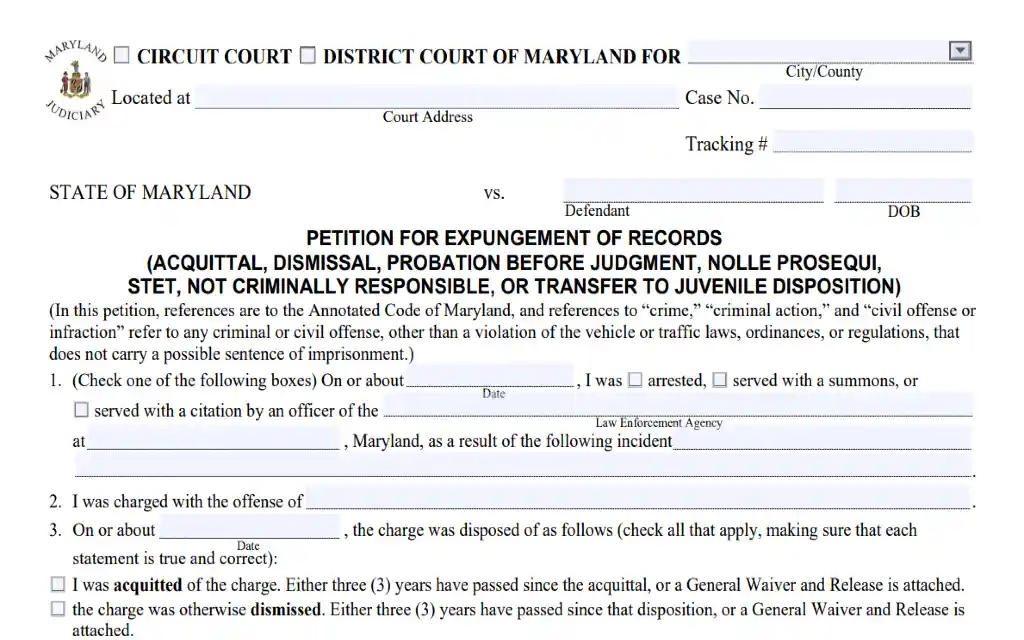
- Massachusetts requires petitioners to fill out and submit a petition to seal non-conviction record form to the trial court for consideration. There is no fee to submit the form.41
- Michigan allows for the automatic expungement of records when there is a non-conviction (i.e. charges were dropped, dismissed or a not-guilty verdict was returned). Individuals can get information on assistance with expungements through the Attorney General’s Office.42
- Minnesota allows individuals to request assistance sealing records through the Attorney General’s Office online portal. Sealed records in Minnesota are not open to public scrutiny.43
- Mississippi requires petitioners to submit a request to the court for charges that resulted in a non-conviction.44
- Missouri allows for charges that resulted in non-conviction to be expunged/sealed from public scrutiny. The filing fee is set at $250.45
- Montana allows petitioners to submit a Record Removal Form for non-conviction cases prior to 1 July 2017. For non-conviction charges after 1 July 2017, data is removed from the database automatically.46
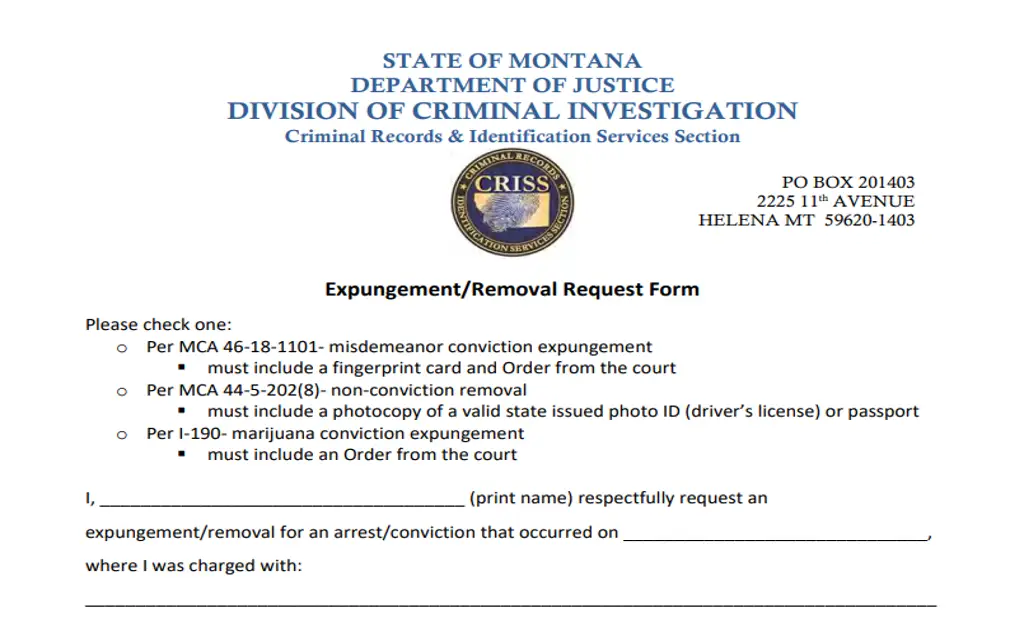
- Nebraska allows for sealing criminal charges that resulted in a non-conviction (dropped or dismissed or not-guilty verdict) by petitioning the court for relief.47
- In Nevada, sealing or expunging records of non-conviction charges requires petitioners to file with the court in the county the charge was issued for relief.48
- New Hampshire requires petitioners to file an application to annul criminal records and pay a fine of a minimum of $125 per court location.49
- New Jersey has online portal petitioners can use to request non-conviction charges be expunged. The portal can be accessed here.50
- New Mexico petitioners in New Mexico complete the New Mexico Court Expungement Forms and file them with the court system that has jurisdiction and pay a fee of $132.51
- New York does not expunge records; however, in cases where charges resulted in non-conviction, records can be sealed following a petition to the court.52
- North Carolina allows petitioners to file an action with the district court to request an expunction of criminal charges that resulted in dismissal or not-guilty verdicts. Individuals file a Petition and Order of Expunction to start the process.53
- North Dakota does not expunge adult criminal records, but individuals with charges that result in a non-conviction can petition the court to have records sealed from public view.54
- Ohio also does not expunge adult records but allows for non-conviction records to be sealed from public view. There is no waiting period to file a petition to seal dropped or dismissed charges. Arrest records that didn’t result in charges can be destroyed pursuant to a request to the chief of police at the department that effectuated the arrest.55
- Oklahoma allows petitions to file a motion with the court for free, but there is a $150 processing fee to expunge an arrest record.56
- Oregon petitioners submit a Set Aside Request form to start the process of expunging non-conviction charges. There is a $33 fee for this form. A motion is then filed with the court to review and expunge the record in question.57
- Pennsylvania’s Clean Slate program started automatically sealing records of charges resulting in non-conviction in June 2019.58
- Rhode Island requires petitioners to file a Motion and Affidavit to expunge or seal records with the clerk of court’s office. A hearing on the motion is held within 10 days of filing.59
- South Carolina expunges dismissed or dropped charges filed after 2009 immediately. Petitioners with dropped or dismissed charges prior to 2009 must file a petition with the court to have the records expunged. Fees start at $25 for the filing fee, $35 for the criminal record check, and approximately $250 minimum for attorney fees.60
- South Dakota allows petitions to file for expunging records one year after an arrest if no charges have been preferred, one year after a district attorney has formally dismissed a charge, or immediately if there is an acquittal.61
- Tennessee expungements require the petition to file a motion in the court where the case originally was heard or processed and pays a $100 fee. If a case was “dismissed with costs” the individual must satisfy these costs before the record can be expunged.62
- Texas legal aid has developed an expunction toolkit for individuals who had charges that were dropped or dismissed or returned a not-guilty verdict. The toolkit guides petitioners through the process and contains the necessary forms.63
- Utah is currently in the process of automatically expunging records where charges resulted in non-conviction.64
- Vermont allows the court to order sealing the record of non-conviction charges within 60 days of entering a final disposition or any time agreed upon by the defense and prosecution.65
- Virginia expungement laws only apply to non-convictions and require a petition to be filed with the court where the action was first processed. Once a petition is filed, the Commonwealth of Virginia has 21 days to respond if an objection is being filed.66
- Washington state law allows sealing adult records when a non-conviction has occurred. The individual must file a petition with the court where the charge originated. Vacated convictions are sealed, not destroyed. Arrest records or investigative records that contain non-conviction data can be deleted.67
- West Virginia requires the filing of a petition with the clerk of the court’s office and payment of a $200 filing fee. When expungement is granted, an additional $100 fee is assessed for the records division to process the expungement. Additional fees may also be assessed.68
- Wisconsin allows for the removal of arrest records and fingerprint cards when charges are dropped, dismissed or there is a non-conviction in the matter. There is no fee to request record removal in these circumstances.69
- Wyoming allows for the automatic expungement of arrest records or criminal charges after 180 days when no charges are preferred pursuant to an arrest or 180 days after a non-conviction on charges are preferred. Individuals can file a motion to expunge a record in Wyoming. There is no filing fee involved.70
The Difference Between Expunged vs. Sealed Records
Sealed charges are those that contain specific criteria that must be met, such as fines or community service, or records for protected individuals, such as minors, that are not open to public scrutiny.
Sealed records can only be viewed under certain extenuating circumstances and require a court order to unseal the records.
Expunged records are erased completely from a person’s criminal history and cannot be used against the individual. Not all states have the same procedures for expunging records.
Some allow for immediate relief for dropped or dismissed charges, some have waiting periods before petitions to expunge can be filed. Some states will not allow records to be expunged if there is more than one conviction on a person’s criminal history, while other states do not allow individuals to expunge records at all.
Due to nationwide efforts, more states are adopting ban-the-box laws to give individuals a second chance. When dropped charges show up on a criminal record, it can impact employability, so take steps now to expunge charges resulting in non-conviction.
So, when wondering if dropped charges show up on a background check, the answer is yes, but they do not have to be the entire story thanks to ban the box laws within some states, federal statutes like the Fair Chance Act and the ability to seal or expunge certain records.
References
1 Automatic Clearing of Records. (2021, July 19). National Conference of State Legislatures. Retrieved June 23, 2022, from <https://www.ncsl.org/research/civil-and-criminal-justice/automatic-clearing-of-records.aspx>
2 Arrest and Conviction Records: Resources for Job Seekers, Workers and Employers. (n.d.). US Equal Employment Opportunity Commission. Retrieved June 23, 2022, from <https://www.eeoc.gov/arrestandconviction>
3 Section 1203.425 – Monthly review of criminal justice databases; automatic conviction record relief, Cal. Pen. Code § 1203.425. (n.d.). Casetext. Retrieved June 23, 2022, from <https://casetext.com/statute/california-codes/california-penal-code/part-2-of-criminal-procedure/title-8-of-judgment-and-execution/chapter-1-the-judgment/section-1203425-monthly-review-of-criminal-justice-databases-automatic-conviction-record-relief>
4 Chapter 961a – Criminal Records. (n.d.). Connecticut General Assembly. Retrieved June 23, 2022, from <https://www.cga.ct.gov/current/pub/chap_961a.htm>
5 Georgia Criminal History Record Restrictions | Georgia Bureau of Investigation. (n.d.). Georgia Bureau of Investigation. Retrieved June 23, 2022, from <https://gbi.georgia.gov/georgia-criminal-history-record-restrictions>
6 Illinois Compiled Statutes. (n.d.). Illinois General Assembly – Illinois Compiled Statutes. Retrieved June 23, 2022, from <https://www.ilga.gov/legislation/ilcs/fulltext.asp?DocName=002026300K5.2>
7 Kentucky Expungement. (2020, July 15). 431.076 Expungement of criminal records for those acquitted of crimes, for whom charges have been dismissed but not in exchang. Retrieved June 23, 2022, from <https://apps.legislature.ky.gov/law/statutes/statute.aspx?id=50191>
8 Section 28.243. (n.d.). Michigan Legislature. Retrieved June 23, 2022, from <https://www.legislature.mi.gov/(S(anrk4jrugro0laykko3d55nf))/mileg.aspx?page=GetObject&objectname=mcl-28-243>
9 Section 29-3523. (n.d.). Nebraska Legislature. Retrieved June 23, 2022, from <https://nebraskalegislature.gov/laws/statutes.php?statute=29-3523>
10 Grant, G. A. (2021, July 1). Notice and Order – Automated Processes for Certain Marijuana and Hashish Cases in Accordance with the Marijuana Decriminalization. NJ Courts. Retrieved June 23, 2022, from <https://www.njcourts.gov/notices/2021/n210702h.pdf?c=I2V>
11 Legislation. (2021, April 2). Legislation | NY State Senate. Retrieved June 23, 2022, from <https://www.nysenate.gov/legislation/laws/CPL/160.50>
12 Expungement of Records. (n.d.). 15A-146. Expunction of records when charges are dismissed or there are findings of not guilty. Retrieved June 23, 2022, from <https://www.ncleg.gov/EnactedLegislation/Statutes/HTML/BySection/Chapter_15a/GS_15a-146.html>
13 North Dakota Century Code t12.1c32. (n.d.). North Dakota Legislative Branch |. Retrieved June 23, 2022, from <https://www.ndlegis.gov/cencode/t12-1c32.pdf>
14 OKLAHOMA STATUTES TITLE 21. CRIMES AND PUNISHMENTS. (n.d.). Oklahoma Senate. Retrieved June 23, 2022, from <https://oksenate.gov/sites/default/files/2019-12/os21.pdf.>
15 Title 18. (n.d.). Title 18 – PA General Assembly. Retrieved June 23, 2022, from <https://www.legis.state.pa.us/cfdocs/legis/LI/consCheck.cfm?txtType=HTM&ttl=18&div=0&chpt=91&sctn=22&subsctn=2>
16 South Carolina Legislature. (n.d.). South Carolina Legislature. Retrieved June 23, 2022, from <https://www.scstatehouse.gov/code/t17c022.php>
17 Codified Law 23A-3. (n.d.). South Dakota Legislature. Retrieved June 23, 2022, from <https://sdlegislature.gov/Statutes/Codified_Laws/2048386>
18 Expungements Under 40-32-101 (g) | District Attorney General Glenn R. Funk. (n.d.). Davidson County District Attorney’s Office. Retrieved June 23, 2022, from <https://da.nashville.gov/the-courtroom/expungements-under-40-32-101-g/>
19 SB0035. (n.d.). Utah Legislature. Retrieved June 23, 2022, from <https://le.utah.gov/~2022/bills/static/SB0035.html>
20 Code of Virginia (2021 Updates). (n.d.). Code of Virginia (2021 Updates). Retrieved June 23, 2022, from <https://law.lis.virginia.gov/vacodeupdates/title19.2/section19.2-389.3/>
21 Charges Dropped vs. Charges Dismissed: Which Is Preferable? Charges Dropped vs. Charges Dismissed: Which Is Preferable? (2021, November 30). Seth Kretzer. Retrieved June 23, 2022, from <https://kretzerfirm.com/charges-dropped-vs-charges-dismissed/>
22 PETITION FOR EXPUNGEMENT OF RECORDS. (n.d.). | Alabama Law Enforcement Agency. Retrieved June 23, 2022, from <https://www.alea.gov/sites/default/files/expungement-forms/Expungement-PetitionForExpungementOfRecords.pdf>
23 Alaska – Guide to Pardon, Expungement & Sealing. (2022, January 17). Collateral Consequences Resource Center. Retrieved June 23, 2022, from <https://ccresourcecenter.org/state-restoration-profiles/alaska-expungment-pardon-sealing/>
24 Setting Aside Judgment. (n.d.). 13-905 – Setting aside judgment of convicted person on discharge; application; release from disabilities; certificate of second chance; firearm possession; exceptions. Retrieved June 23, 2022, from <https://www.azleg.gov/ars/13/00905.htm>
25 EXPUNGEMENT. (n.d.). Arkansas Department of Corrections. Retrieved June 23, 2022, from <https://doc.arkansas.gov/wp-content/uploads/2020/10/FSExpungement_0.pdf>
26 Penal Code 851.8. (n.d.). California Legislative Information. Retrieved June 23, 2022, from <https://leginfo.legislature.ca.gov/faces/codes_displaySection.xhtml?sectionNum=851.8.&lawCode=PEN>
27 Expungements and sealings | Student Legal Services. (n.d.). University of Colorado Boulder. Retrieved June 23, 2022, from <https://www.colorado.edu/studentlegal/services/criminal/expungements-and-sealings>
28 Pardon FAQs. (n.d.). CT.gov. Retrieved June 23, 2022, from <https://portal.ct.gov/BOPP/Pardon-Division/Pardon/Pardon-FAQs>
29 ADULT EXPUNGEMENT INSTRUCTION PACKET. (n.d.). Delaware Courts. Retrieved June 23, 2022, from <https://www.courts.delaware.gov/Forms/Download.aspx?id=118608>
30 Seal and Expunge FAQ. (n.d.). Florida Department of Law Enforcement. Retrieved June 23, 2022, from <https://www.fdle.state.fl.us/Seal-and-Expunge-Process/Frequently-Asked-Questions#Record_Seales_or_Expunged>
31 Expungement FAQs. (n.d.). Hawaii Criminal Justice Data Center | Expungement Frequently Asked Questions. Retrieved June 23, 2022, from <https://ag.hawaii.gov/hcjdc/expungement-frequently-asked-questions/>
32 Do you qualify for an Expungement? (n.d.). Idaho State Police. Retrieved June 23, 2022, from <https://isp.idaho.gov/bci/wp-content/uploads/sites/3/2019/10/ExpungmentFlowChart.pdf>
33 Expungement & Sealing. (n.d.). – Expungement & Sealing. Retrieved June 23, 2022, from <https://www2.illinois.gov/osad/Expungement/Pages/Expungement-and-Sealing-General-Information.aspx>
34 Indiana Code 2018. (n.d.). Indiana Code 2018 – Indiana General Assembly, 2022 Session. Retrieved June 23, 2022, from <http://iga.in.gov/legislative/laws/2018/ic/titles/035/#35-38-9>
35 Expungement | Student Legal Services. (n.d.). Student Legal Services. Retrieved June 23, 2022, from <https://studentlegal.uiowa.edu/know-the-law/criminal-law/expungement>
36 Expungement (Adult). (n.d.). Kansas Judicial Council. Retrieved June 23, 2022, from <https://www.kansasjudicialcouncil.org/legal-forms/expungement-adult>
37 Home AOC Information & Technology Expungement Certification Process. (n.d.). Kentucky Court of Justice. Retrieved June 23, 2022, from <https://kycourts.gov/AOC/Information-and-Technology/Pages/Expungement.aspx>
38 Louisiana Laws. (n.d.). Louisiana Laws – Louisiana State Legislature. Retrieved June 23, 2022, from <https://legis.la.gov/Legis/LawPrint.aspx?d=1054558>
39 Maine State Bureau of Identification: Programs: Criminal History Record Information: Criminal Record Challenge Process. (n.d.). Maine.gov. Retrieved June 23, 2022, from <https://www.maine.gov/dps/Sbi/challenge.html>
40 Expungement (Adult). (n.d.). Maryland Courts. Retrieved June 23, 2022, from <https://mdcourts.gov/legalhelp/expungement>
41 What you need – for Request to seal your criminal record. (n.d.). Mass.gov. Retrieved June 23, 2022, from <https://www.mass.gov/how-to/request-to-seal-your-criminal-record>
42 Expungement Assistance. (n.d.). State of Michigan. Retrieved June 23, 2022, from <https://www.michigan.gov/ag/initiatives/expungement-assistance>
43 Sealing My Criminal Records | Office of Attorney General Keith Ellison. (n.d.). Minnesota Attorney General. Retrieved June 23, 2022, from <https://www.ag.state.mn.us/Office/Expungement.asp>
44 MISSISSIPPI LEGISLATURE REGULAR SESSION 2019 By: Representatives White, Karriem, Taylor, Kinkade, Dixon, Baria, Boyd, Wil. (n.d.). MS Legislature. Retrieved June 23, 2022, from <http://billstatus.ls.state.ms.us/documents/2019/pdf/HB/1300-1399/HB1352SG.pdf>
45 SENATE BILL NOS. 588, 603 & 942. (2016). Missouri State Government. Retrieved June 23, 2022, from <http://www.senate.mo.gov/16info/pdf-bill/tat/SB588.pdf>
46 Non-Conviction Removal and Sealing. (n.d.). Montana Department of Justice. Retrieved June 23, 2022, from <https://dojmt.gov/enforcement/non-conviction-removal-and-sealing/>
47 Clean Slate. (n.d.). Legal Aid of Nebraska. Retrieved June 23, 2022, from <https://www.legalaidofnebraska.org/how-we-help/programs-and-projects/clean-slate/>
48 NRS: CHAPTER 179 – SPECIAL PROCEEDINGS OF A CRIMINAL NATURE; SEALING RECORDS OF CRIMINAL PROCEEDINGS; REWARDS; FORMS. (n.d.). Nevada Legislature. Retrieved June 23, 2022, from <https://www.leg.state.nv.us/NRS/NRS-179.html#NRS179Sec255>
49 Annulment of Criminal Records. (2020, August 24). Annulment of Criminal Records. Retrieved June 23, 2022, from <https://www.courts.nh.gov/sites/g/files/ehbemt471/files/documents/2021-04/annulmentchecklist.pdf>
50 Guide, s. (n.d.). eCourts Expungement System. NJ Courts. Retrieved June 23, 2022, from <https://www.njcourts.gov/selfhelp/expungement.html>
51 Welcome. (n.d.). Welcome | Criminal Justice and Employment Initiative. Retrieved June 23, 2022, from <https://cjei.cornell.edu/fix-your-record/sealing-and-expungement/expungement/new-mexico-expungement>
52 Sealed Criminal Records | NY CourtHelp. (2021, June 9). Unified Court System. Retrieved June 23, 2022, from <https://www.nycourts.gov/courthelp/criminal/sealedRecords.shtml>
53 Petition And Order Of Expunction Under GS 15A-146(a) Or GS 15A-146(a1) (Charge(s) Dismissed); Instructions For Petition And Order Of Expunction Under GS 15A-146(a) Or GS 15A-146(a1) (Charge(s) Dismissed). (2018, April 6). The North Carolina Judicial Branch. Retrieved June 23, 2022, from <https://www.nccourts.gov/documents/forms/petition-and-order-of-expunction-under-gs-15a-146a-or-gs-15a-146a1-charges-dismissed-instructions-for-petition-and-order-of-expunction-under-gs-15a-146a-or-gs-15a-146a1-charges-dismissed>
54 SEALING CRIMINAL RECORDS (NDCC Ch. 12-60.1) – A Research Guide for a North Dakota State Court Process. (2019, November 8). North Dakota Supreme Court. Retrieved June 23, 2022, from <https://www.ndcourts.gov/Media/Default/legal-resources/legal-self-help/other-forms/Sealing%20Criminal%20Records%20Research%20Guide.pdf>
55 Sealing An Ohio Criminal Record. (n.d.). Legal Aid Society of Clevelanda. Retrieved June 23, 2022, from <https://lasclev.org/wp-content/uploads/Sealing-an-Ohio-Criminal-Record-English-10.2018-final.pdf>
56 Criminal Record Expungements. (n.d.). Oklahoma State Bureau of Investigation |. Retrieved June 23, 2022, from <https://osbi.ok.gov/sites/g/files/gmc476/f/documents/Criminal_Record_Expungement_TRIFOLD_11-2019_0.pdf>
57 Oregon Judicial Department : Expungement : Self Help : State of Oregon. (n.d.). Oregon Judicial Department. Retrieved June 23, 2022, from <https://www.courts.oregon.gov/courts/lane/help/Pages/Expungement.aspx>
58 My Clean Slate PA. (n.d.). Home – My Clean Slate PA. Retrieved June 23, 2022, from <https://mycleanslatepa.com/>
59 INSTRUCTIONS FOR FILING A MOTION TO EXPUNGE OR SEAL RECORD 1. Fill in the required fields in the Motion to Expunge or Seal Reco. (n.d.). Courts.RI.gov. Retrieved June 23, 2022, from <https://www.courts.ri.gov/PublicResources/forms/Superior%20Court%20Forms/Motion%20and%20Affidavit%20to%20Expunge%20or%20Seal%20Record%20-%20Misdemeanor.pdf>
60 SC Expungement Reference Guide – SC Appleseed. (n.d.). SC Appleseed Legal Justice Center. Retrieved June 23, 2022, from <https://www.scjustice.org/brochure/sc-expungement-reference-guide/>
61 South Dakota – Guide to Pardon, Expungement & Sealing. (2022, March 24). Collateral Consequences Resource Center. Retrieved June 23, 2022, from <https://ccresourcecenter.org/state-restoration-profiles/south-dakota-restoration-of-rights-pardon-expungement-sealing/>
62 Updated Expungement Information Coming Soon to Reflect Changes to TCA §40-32-101. (n.d.). Tennessee Administrative Office of the Courts. Retrieved June 23, 2022, from <https://www.tncourts.gov/expungements>
63 I need to clear an arrest from my record (expunction). (2022, June 17). Texas Law Help. Retrieved June 23, 2022, from <https://texaslawhelp.org/guide/i-need-to-clear-an-arrest-from-my-record-expunction>
64 Expunging Adult Criminal Records. (n.d.). Utah Courts. Retrieved June 23, 2022, from <https://www.utcourts.gov/howto/expunge/>
65 Vermont Laws. (n.d.). Vermont Laws. Retrieved June 23, 2022, from <https://legislature.vermont.gov/statutes/fullchapter/13/230>
66 Expungement and Sealing of Criminal Records. (2021, July 1). Virginia State Crime Commission. Retrieved June 23, 2022, from <http://vscc.virginia.gov/2021/VSCC%202020%20Annual%20Report%20Expungement%20and%20Sealing.pdf>
67 Sealing and Destroying Court Records, Vacating Convictions, and Deleting Criminal History Records in Washington State. (n.d.). Washington State Courts. Retrieved June 23, 2022, from <https://www.courts.wa.gov/content/publicUpload/Publications/SealingandDestroyingCourtRecords.pdf>
68 EXPUNGEMENT INSTRUCTIONS. (2019, June 4). West Virginia Judiciary. Retrieved June 23, 2022, from <http://www.courtswv.gov/lower-courts/expungement/SCA-C900.pdf>
69 Removal of Arrest Information. (n.d.). Wisconsin Department of Justice. Retrieved June 23, 2022, from <https://www.doj.state.wi.us/sites/default/files/expunge.pdf>
70 Title – 7.docx. (n.d.). Wyoming Legislature. Retrieved June 23, 2022, from <https://wyoleg.gov/statutes/compress/title07.pdf>

